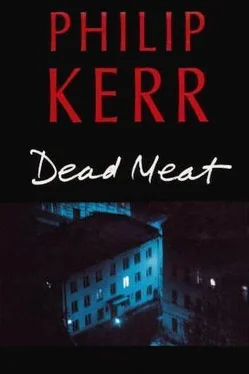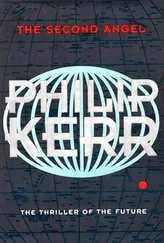His office was big and gloomy, unremarkably Soviet in every way save only for the strange pictures that hung on the yellowing walls; when the telephone rang, I took a closer look at them.
Although they were expensively framed, none of the oil-pastel drawings looked particularly well rendered. But then lack of talent never stopped anyone from making a living as an artist in Russia. At the same time, what had been drawn was easily recognisable, even familiar, to anyone who has seen a science-fiction comic. There were four pictures in all and they formed a sequence that told the story of a man driving a car at night whose journey was interrupted by the arrival of an alien spaceship and who was engaged in conversation by one of these strange beings prior to being taken away in the flying saucer on a day-trip to a strange planet. UFOs were a common enough interest among people: UFOs, faith-healers, spiritualism, Nostradamus, pyramid power and Satanism. When it was a matter of believing in the impossible we are a most credulous people. Maybe that’s not such a surprise. After all, we have had more than seventy years of practice.
I turned and found Grushko standing at my shoulder. He nodded with polite appreciation as the director replaced the telephone.
‘You’ve certainly picked a busy day to come and see us,’ said the director. ‘After the local priest has finished blessing our new canteen, the newspapers are coming here to photograph those pictures and to interview me about my UFO experience.’
I felt my jaw slacken with surprise.
‘I imagine that’s where we’ll find Georgi Rodionov,’ he said.
‘What?’ I heard myself say. ‘In a UFO?’
The director chuckled. ‘No, in the canteen. You’ll stay to lunch, of course?’
‘Well—’ Grushko glanced at his watch.
‘But I insist. Our canteen is excellent. You won’t find a better one. Not anywhere. To be honest, we put a lot of cooperative restaurants to shame. You and Georgi can have your little chat in the officers’ dining-room.’
Grushko was still too surprised to disagree with him.
‘Er, fine,’ he said, and we followed the director into the corridor.
‘He’s not in any trouble, I hope. Georgi’s a good man. Best weapons instructor I’ve ever had.’
We hurried by some women who were busy replastering a wall.
‘We just want to ask him a few questions,’ said Grushko. ‘About an old inquiry.’
The director stopped abruptly and flung open a door. Several cadets looked up from the gym equipment they were exercising on.
‘Carry on,’ he yelled at them. Then he looked at the two of us and grinned. ‘What do you think? I got a couple of metal workers to copy some American Nautilus equipment. Otherwise we could never have afforded a gym like this. In the evening this place is a health and fitness club for the local community. Leastways for those who are prepared to pay the membership fee. All the money is ploughed back into the Academy. Not bad, eh?’
Grushko and I conceded that he had done well. The director was starting to interest me in a way I had not expected.
We moved on down the corridor and once again he stopped and flung open another door. This time it was a large lecture theatre with a cinema screen.
‘At the weekend,’ he said without any sign of embarrassment, ‘this is the town cinema. Schwarzenegger, Stallone, Madonna — anything. For just two roubles a head.’
‘You seem to have thought of everything,’ I said.
‘To run a place like this, you have to be a good businessman. The new canteen cost 50,000 roubles. The money has to come from somewhere. It certainly doesn’t come from the Ministry.’ He laughed bitterly. ‘You find it any way you know how. And it’s lucky I know how.’
I wondered how much the UFO story was likely to raise. The pictures had been a shrewd addition: they would probably double the price. I began to like the director. He didn’t care what people thought of him just so long as it brought in the money to improve the facilities for his cadets. At the same time I saw how the success of his UFO story depended on his never admitting the truth to anyone. The man wasn’t corrupt, he was a genius. He ought to have been put in charge of the entire militia budget. He could probably have dreamed up a way of doubling that too.
In the new canteen nearly three hundred cadets were already seated at their refectory tables. Like their senior officers and the dinner-ladies they were awaiting the arrival of the black priest. With any Russian ceremony there is always a lot of waiting around. Grushko and I followed the director into the centre of the room and then suddenly, as if by magic, the priest and his acolyte were among us.
The priest was a young man of about thirty who stood a head taller than anyone else in the canteen so that his sharp blue eyes seemed to be on everyone. He was bearded and, as was traditional, he wore his hair long and tied in a tail behind his head. He was clothed in a voluminous black cassock with wide mandarin sleeves, a long white silk-brocade tippet, and a large cross on a silver chain. Handsome, and younger than most of the priests I had ever seen, he was also a dead ringer for Rasputin. His acolyte was altogether less distinguished, being younger, fatter, clean-shaven and rather sleepy-looking, as if he had just rolled out of a warm, greasy bed.
The director barked something at the cadets who, as one man, stood to attention. They were not entirely silent and I heard a few remarks and corresponding guffaws as the priest, taking it all in good part, addressed a short sermon to his strange flock.
Especially by the standards of the Russian Orthodox Church, this was not a long sermon, lasting only three or four minutes; and the blessing, with sung responses from the nasal-sounding acolyte and which lasted perhaps six or seven minutes, was not a long blessing. But since the lunch of soup and sausage was already cooling on the tables, the priest’s little service seemed interminable.
Finally, as if to make quite certain that the food was cold, the two of them walked solemnly round the whole canteen, liberally dousing cadets, tables, walls and food with lashings of holy water. A light murmur of discomfort turned louder with amusement and the director took advantage of the stir to find Georgi Rodionov and then usher the three of us into an annexe to the main canteen that was the officers’ dining-room. He sat us down at his own table and hospitably served us himself with three plates of soup. But he did not join us, claiming, not implausibly, that he was on a strict diet.
‘Quite a character,’ observed Grushko when the director had left us.
‘Isn’t he?’ said Rodionov, and sipped his soup noisily.
‘Is he serious? About the UFO thing?’
‘Oh yes.’ Rodionov looked up from his bowl and shrugged philosophically. ‘These days we all of us have to do some pretty strange things in the way of making a living.’
While Grushko asked his questions, I studied the Academy’s weapons-instructor. Rodionov was a strong-looking man with fair hair, blue eyes, a broad nose and thick sensual lips. But for the height of his cheekbones, he might have passed for a German or a Pole. It was a distinguished, dreamy sort of face, as might have better suited a poet rather than a policeman.
‘So tell me about it,’ said Grushko, and drank some soup.
Rodionov scratched his nose self-consciously and looked from side to side. He was about to answer when Grushko interrupted him.
‘Why didn’t you come forward?’ he said quietly. ‘You knew that we would want to speak to everyone who had any contact with Mikhail Milyukin in the time leading up to his death. So what’s your excuse, mister?’
Rodionov’s appetite was gone. He sat back on his chair and folded his arms defensively.
Читать дальше












